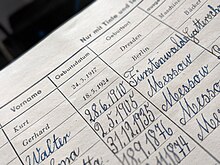House book (GDR)

The house book ( loan translation from Russian домовая книга, domowaja kniga ) was a book in the GDR that was prescribed on September 6, 1951 by the statutory reporting regulations on the introduction of house books . As a rule, it was led by a tenant (house steward), in the case of private houses also the owner of the house. The names, dates of birth and professions of the respective tenants and sub-tenants of a house, as well as the location of the respective apartment were listed on initially 15 and finally 64 pages (e.g. "1st floor right").
Visitors from the GDR who stayed longer than three days had to report to the house book officer for entry. For visitors from abroad - this also applied to West Germans ("citizens of the FRG") and West Berliners - the obligation to register was 24 hours after arrival.
In the case of visiting visits, the date of birth, citizenship, the current activity, the address of the main residence, the name of the person visited, the period of the visit and any registration and de-registration with the People's Police (DVP) had to be entered in addition to the name of the person . For visitors from abroad, the date of crossing the border was also added. Non-GDR citizens had to report to the People's Police within 24 hours. GDR citizens had to report to the DVP if the visit period exceeded 30 days.
The house book was to be presented to the People's Police, the voluntary helpers of the DVP or the employees of the State Security on request.
After the fall of the Berlin Wall , those responsible for the house book were asked to hand over the house books to the registration office or a police station.
It was common practice in the GDR to check the house book without prior notification by legendary persons, i.e. public officials. Unofficial employees (IM) of the Stasi used this, always stating an incorrect official status (e.g. youth welfare office), to gain access to apartments and to interview tenants, apparently to verify house book entries.
Web links
- Ordinance on the reporting system in the GDR Regulations for keeping the house book under § 14 and § 15
- Baltic legal dictionary sv Hausbuch (On the history of the house book in the Russian Empire. The later Soviet Union retained this form of the registration procedure.)

